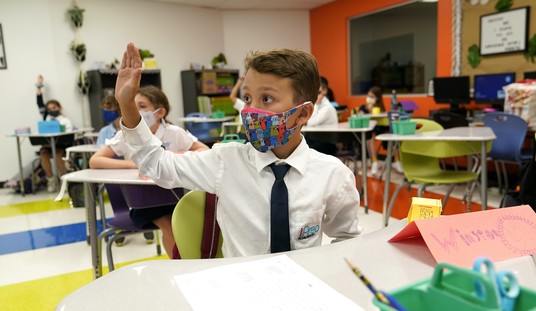On Thursday afternoon, Britain discovered that Prince Harry has been fighting in Afghanistan since before Christmas. Under conditions of the utmost secrecy, the prince, third in line to the throne, has been serving as a forward air controller on the front line in Helmand province, in the south of the country, guiding air strikes on Taliban targets in conjunction with the US Air Force, the British RAF and other coalition forces.
For nearly three months this was the best-kept secret in journalism – apart, of course, from all the others that we don’t know about. In return for interviews and access to Harry both before and during his tour of duty, British and some foreign media outlets agreed to impose a complete news blackout until after he had returned from active service. Despite leaks on a couple of small websites, the story stayed under wraps until yesterday, when Drudge ran the story and made further secrecy impossible. (Between that and his photo of Obama in tribal robes on Monday, it’s been a good week for Drudge, on his terms at least.)
It may seem incredible that Britain’s infamous tabloids were willing to embrace such a swingeing self-denying ordnance, but it’s merely an extension of the pact they struck after the death of Diana, whereby access to the Princes was granted in carefully controlled chunks in return for their discretion in covering the boys while they were still growing up. As William and Harry reached adulthood and began to adopt the kind of playboy lifestyles that eligible and rich young men inevitably will, the deal was quickly forgotten. Photos of Harry, in particular, falling out of nightclubs on the arms of random blondes became a staple of the Monday papers. But active service on the front line is another matter altogether. Aware of which side their bread was buttered, and wary of upsetting an often conservative readership, the media fell into line willingly.
In many ways, this is an ideal tabloid story, tapping in to uncomplicated veins of patriotism, bravery, and the still-strong respect for the institution of the monarchy (if not always its personnel). For the more discerning observer, too, there are plenty of pleasing echoes to the tale; the revelation that it was the monarch herself who told Harry of his imminent deployment; that it was to Afghanistan, setting for the colonial exploits romanticised by Kipling and MacDonald Fraser’s Flashman novels, that he was posted; and that he was serving alongside the last vestiges of that imperial army – the feared Gurkhas of Nepal, the best infantrymen in the world. Why, even his nickname, Harry, recalls famous warrior princes of Shakespearean legend; should he succeed to the throne, it would be as Henry IX.
Reality is more prosaic. Harry was supposed to have served in Iraq last year, but after extended dithering, the Ministry of Defence decided that Lieutenant Wales would just be too tempting a target for the insurgents, and he was forced, much to his reported disgust, to stay at home. (His men showed that they could manage without the officer they refer to with typical irreverence as the “ginger bullet magnet”, though; they donned T-shirts printed with giant crosshairs and the faux-Spartacus tribute “I’m Harry!” in solidarity.) When the deployment finally came, it was short-lived. As of Friday morning, the prince has immediately been withdrawn from the front line in Afghanistan as a result of the breach of the press embargo, and is probably on a Hercules home as I write this. It seems unlikely that he will be permitted to return. In the era of modern warfare, having a bullet magnet on the front line, royal or otherwise, is no good to anyone.
The positive publicity for the mission in Afghanistan will do no harm at all. After Iraq, nation-building is very definitely out of fashion among the European public, and British opinion is no different. Nearly a hundred British soldiers have now died in Afghanistan, the majority in the last two years of dirty, intense fighting in Helmand, and yet media coverage has been patchy and often ill-informed. Many troops believe that their sacrifices are being forgotten or ignored, bumped down the running order by more exciting but less important stories. Briefly, at least, that changed this week.
The effect on the young royal’s public image is likely to be markedly positive, too. Prior to this week, the most famous photo of Harry in uniform was an infamous and wildly misjudged Nazi costume at a fancy dress party a couple of years back. Old colonels harrumphed and spluttered; younger and more cynical generations merely sneered. Despite the continuing support for the monarchy, which is widespread if hardly rock-solid, it is now commonplace to hear people speculate that the institution may not long survive the present Queen. The reminder that the royal family is about more than just gaffes and affairs, then, is timely.
Harry didn’t have to spend his Christmas on his belly in the dirt and dogshit of Afghanistan; he volunteered for the army, as his forebears have for hundreds of years, at least partly out of a sense of duty and an awareness of his place in public life. That’s more than most of his critics can say. To hear a word like “duty” applied to the playboy Prince is strange and refreshing; many of us, to borrow a phrase from a famous soldier, too often use it as a punchline. We do indeed live in a world that has walls, even if we don’t always agree where they should be sited, and those walls have to be guarded by men with guns. Despite myself, I’m strangely stirred by the fact that our royalty serve among them.
Mr. Eugenides is a Scottish blogger.









Join the conversation as a VIP Member